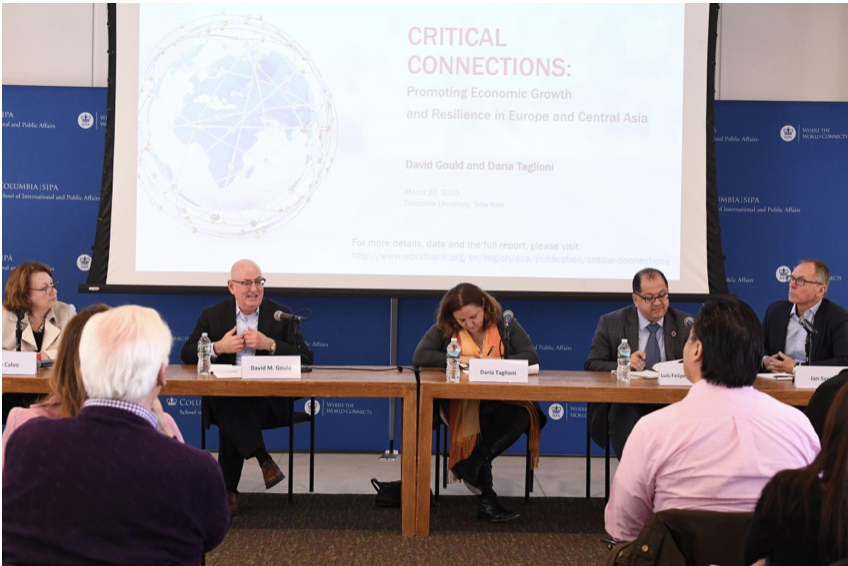Critical Connections - Presentation of the World Bank report on Promoting Economic Growth and Resilience in Europe and Central Asia
Critical Connections
Promoting Economic Growth and Resilience in Europe and Central Asia
On Wednesday, March 27th, the Center on Global Economic Governance at Columbia University hosted World Bank Economists David Gould and Daria Taglioni as they presented on the World Bank’s recent report titled “Critical Connections: Promoting Economic Growth and Resilience in Europe and Central Asia”. The aim of the report is to help policy makers focus on their long-term goals to capture the benefits of global interdependence through trade, foreign direct investment, migration, telecommunication, transportation, and other avenues that facilitates the transfers of knowledge and technology that are critical to long-term growth and shared prosperity.
Sara Calvo, Lecturer in the Discipline of International and Public Affairs, moderated the conversation, with discussants Luis Felipe López-Calva, UN Assistant Secretary General and UNDP Regional Director for Latin America and the Caribbean, and Jan Svejnar, James T. Shotwell Professor of Global Political Economy School of International and Public Affairs and Director of the Center on Global Governance.
“Critical Connections” provides valuable insights into the nuances of economic connectivity and interdependence, based on the experiences of the more advanced and the smaller emerging economies that make up the Europe and Central Asia region. The report highlights three key messages. First, being well-connected in the global network of countries is important for long-run inclusive economic growth. Second, because of the complementarities in the types of connections between countries, a balanced profile is more important than being well-connected in a single dimension. Third, deep and comprehensive free trade agreements, bilateral investment treaties, transportation and migration policy are several ways to achieve maximum benefits.
One central theme that appears throughout the report’s findings is that when countries suffer from macroeconomic shocks and exposure to trading partners, the solution should not be isolation, which sacrifices growth, but an understanding of the need to broaden the range of connections a country exhibits to reduce the intensity of these risks and better manage the shocks themselves. In the globalization debate, the report finds that policy responses to macroeconomic shocks should not elicit diametrically opposing reactions between openness and isolation. An acknowledgement that macroeconomic openness carries risks can be a first step in a multifaceted economic policy program that seeks to diversify the breadth and range of a country’s connections in much the same way that an asset manager seeks to maximize gains and minimize losses across an investment portfolio.
Discussants Luis Felipe Lopez-Calva and Jan Svejnar brought forward a number of interesting points of consideration. Lopez-Calva’s discussion highlighted the report’s focus on countries as the main units of discussion while not stressing enough a nation’s internal dynamics. Globalization may help bridge countries between each other while not overseeing the equitable distribution of gains within countries, thus exacerbating economic inequality and breeding the kind of resistance that has led to protectionism and nationalism. Having better insight into these internal political and economic dynamics may help answer trends in economic integration, and why, for example, countries may choose not to pursue trade integration in order to avoid further integration of migrants. Moderator Sara Calvo highlighted the importance of deep financial markets to achieve the stated goals, which the report also did not stress enough.
Because the economic benefits of connectivity through technology and knowledge transfers are not always obvious, the report seeks to combat this uncertainty by providing quantitative and economic evidence to advocate for the benefits of connectivity and economic integration and how to best advance economic growth in the European and Central Asia region and beyond. While Critical Connections does not alleviate all concerns related to the global economy, it provides an incisive analysis of the economic interdependence between countries, firms and individuals around the world.
The Center on Global Economic Governance was created with the recognition that without adequate global economic governance there is a greater possibility of major crises and a tendency toward protectionism and political upheaval. It is our mission to develop, promote and implement new theories, studies and policy initiatives that cut across nation-state boundaries and address this new reality.
International connectivity through trade, investment, migration, communications and transport is critical to economic development in Europe and Central Asia. This World Bank Report analyzes the impact of different types of connectivity on growth to help policy makers maximize the economic benefits of these connections across Europe and Central Asia. Critical Connections: Promoting Economic Growth and Resilience in Europe and Central Asia provides an insight into understanding - at the firm and country level - the interdependence of the region and how it has historically, and presently, operated to advance economic growth and prosperity.
Presented by:
David M. Gould, World Bank Lead Economist for the Europe and Central Asia Region and author of the report
Daria Taglioni, Principal Economist for the Europe and Central Asia Region in the Economics and Private Sector Development Vice Presidency of the International Finance Corporation and Task Team Leader of the World Development Report 2020
With discussants:
Luis Felipe López-Calva, UN Assistant Secretary General and UNDP Regional Director for Latin America and the Caribbean and Former World Bank Practice Manager, Poverty and Equity, Europe and Central Asia
Jan Svejnar, James T. Shotwell Professor of Global Political Economy School of International and Public Affairs, Columbia University
Moderator:
Sara Calvo, Lecturer in the Discipline of International and Public Affairs
This event is co-sponsored by Columbia SIPA's Center on Global Economic Governance and MPA in Economic Policy Management program.

